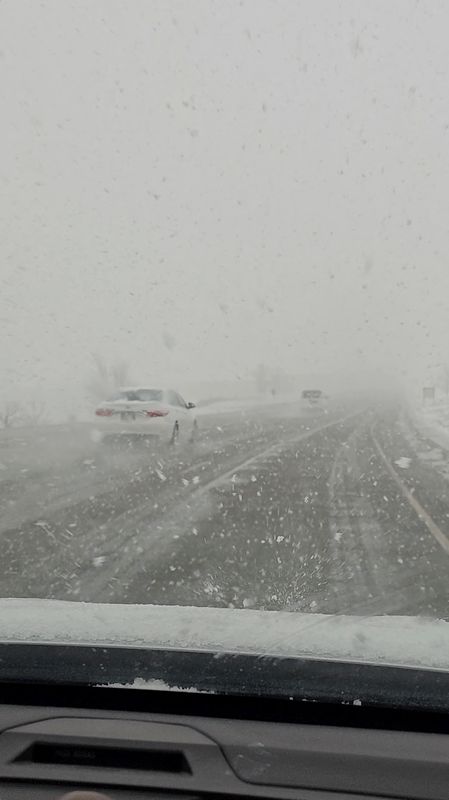California braces for next bout of heavy rain, snow and high winds
2023.03.21 18:04

© Reuters. Vehicles drive during a snowstorm in Clearfield, Utah, U.S., March 20, 2023 in this screen grab taken from a social media video. @justaguyinutah/via REUTERS
By Steve Gorman
LOS ANGELES (Reuters) -The latest spate of harsh wintry weather from the Pacific Ocean churned into storm-weary California on Tuesday, with forecasters warning of wind gusts reaching hurricane force, accompanied by torrential rain and heavy mountain snow.
The newest onslaught, arriving early on the second official day of spring, was expected to hit especially hard in southern and central California, still sodden from storms that have lashed the state relentlessly since late December.
High-wind warnings and advisories were posted for a vast region stretching from the Mexico border through Los Angeles to the San Francisco Bay area. Winter storm warnings were in effect for high mountains, with several feet of snowfall possible.
The National Weather Service (NWS) issued an excessive- rainfall notice for much of the Southern California coast, warning of an at least a 40% chance of showers exceeding flash-flood conditions.
Flood watches were in place for a region of more than 17 million people, including most of greater Los Angeles and a large swath of western and central Arizona.
Heavy showers began drenching the Los Angeles region before dawn and triggered some street flooding but tapered off by early afternoon. A second, possibly stronger, wave of precipitation was forecast later in the day.
The mix of high winds, heavy showers and snow was expected to spread across the Southwestern U.S. into the central Great Basin and Rockies by late on Tuesday and persist through Wednesday night.
It marked the 12th so-called atmospheric river to sweep the U.S. West Coast since December. Coming in two waves that struck California in rapid succession along with other winter storms, the torrential cloudbursts have unleashed widespread flooding, mudslides and punishing surf. More than 20 people have perished.
A Pacific cyclone swirling around an intense low-pressure system was driving the latest storm, steering vast quantities of moisture to the coast, according to meteorologist William Churchill of the NWS Weather Prediction Center.
CENTRAL VALLEY FLOODING
Sand-bagging operations, levee repairs and river patrols were underway in Tulare County, at the southern end of California’s Central Valley agricultural hub. On Sunday, Sheriff Mike Boudreaux expanded evacuation orders for homes and businesses in areas newly flooded from an earlier storm.
Boudreaux’s office said the small, rural communities of Alpaugh and Allensworth had become surrounded by high water that cut off road access after “multiple breaches in the waterways.”
Tulare County Fire Chief Charlie Norman said the mandatory evacuation zone had grown to encompass more than 11,000 residents, while some 3,700 more live in communities under evacuation warnings, the Los Angeles Times reported.
Unlike earlier atmospheric rivers this season, the latest packed a cooler load of moisture, meaning more snow will fall in the higher coastal mountains and Sierra Nevada range.
As much as 3 to 4 feet (1-1.2 meters) were forecast at elevations above 6,000 feet, where some areas remain blanketed in snow left last month.
Up to 3 inches (7.6 centimeters) of rain was expected in coastal regions and valleys of Southern California, and as much as 6 inches in lower mountains and foothills, the NWS said.
Forecasts also called for wind gusts nearing 75 miles per hour (121 kilometers per hour) in Southern California’s mountains and deserts, and 55 mph along coasts and through inland valleys.
AN AMAZON RIVER IN THE SKY
Atmospheric rivers, a term coined in 1994, have been well documented, and scientists say they pose flood risks to an estimated 300 million people around the globe.
The U.S. West Coast has averaged 10 or 11 such storms a year since 1980. Global warming from human-induced climate change will boost that frequency sharply over the next century if it continues at current rates, according to ocean scientist Bin Guan of NASA’s Jet Propulsion Laboratory (NYSE:) near Los Angeles. He said a single atmospheric river typically carries a quantify of water more than double the flow of the entire Amazon (NASDAQ:) River.
But the glut of precipitation has also replenished sorely depleted reservoirs and the state’s mountain snowpack, both providing a critical source for drinking supplies, irrigation, and sustenance for fish and wildlife.








